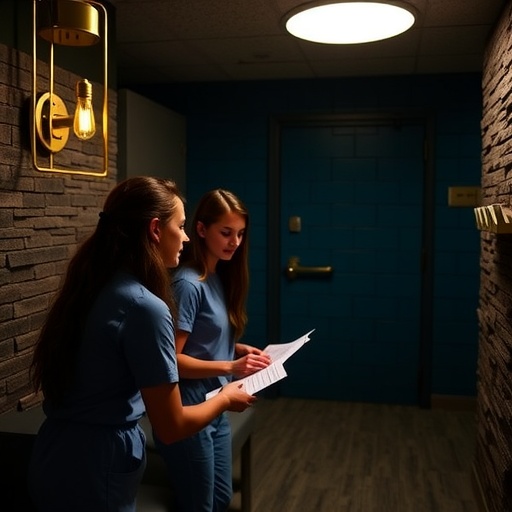In an innovative approach to nursing education, researchers have explored the potential benefits of using educational escape rooms to instill professional nursing values among student nurses. This novel pedagogical strategy, detailed in the upcoming publication by Rowley and Lucas, is set to revolutionize how nursing professionals engage with their studies and prepare for real-world challenges. Central to this investigation is the understanding that traditional teaching methods may fall short in fostering critical thinking, teamwork, and ethical decision-making, all of which are essential competencies for nursing professionals.
Educational escape rooms provide an immersive environment that challenges participants to solve complex puzzles and overcome obstacles within a defined time frame. This interactive experience not only promotes engagement but also encourages students to apply theoretical knowledge in practical scenarios. In the context of nursing education, such environments may bridge the gap between theory and practice, allowing students to witness firsthand the importance of professional values in patient care.
The research conducted by Rowley and Lucas aims to evaluate student nurses’ satisfaction with this unique pedagogical approach. By implementing a series of escape room activities tailored to nursing education, the researchers gathered quantitative and qualitative data to assess the effectiveness of this method. It is anticipated that student feedback will illuminate the strengths and weaknesses of using escape rooms as an educational tool, providing invaluable insights for nursing educators seeking to enhance curriculum delivery.
The excitement surrounding educational escape rooms lies not only in their interactive nature but also in their ability to foster essential soft skills. As students navigate various challenges, they are compelled to communicate effectively, work collaboratively, and think critically—skills that are indispensable in the nursing profession. The research highlights the importance of creating educational experiences that mimic the dynamic and often unpredictable nature of healthcare settings, where teamwork and adaptation are crucial.
Furthermore, the researchers are keen to understand whether the escape room experience instills a deeper appreciation for professional nursing values among participants. Values such as empathy, integrity, and respect are vital in shaping the attitudes and behaviors of future nurses. By translating these values into the context of problem-solving activities, the escape room may serve as a catalyst for personal and professional growth among student nurses.
In light of the ongoing global healthcare challenges, effective nursing education has never been more critical. The incorporation of innovative teaching methods such as educational escape rooms could represent a turning point in how future healthcare professionals are trained. As the nursing profession evolves, so too must the approaches taken by educational institutions to prepare students for the realities of clinical practice.
Evaluating the satisfaction levels of student nurses with this methodology also opens the floor for broader discussions regarding student engagement and retention in nursing programs. When students are excited about their learning experiences, they are more likely to remain committed to their educational journeys. This study could provide compelling evidence to support the integration of similar interactive learning strategies into nursing curricula, encouraging institutions to adopt more progressive teaching philosophies.
The anticipated findings from Rowley and Lucas’s research could influence nursing education on a global scale, inspiring educators to re-evaluate their teaching methods and curricular resources. As educational institutions strive for excellence, embracing innovative pedagogical approaches like escape rooms may lead to enhanced student learning outcomes and ultimately result in better-prepared nursing professionals.
Additionally, the research contributes to a wider conversation surrounding the use of simulation in healthcare education. While traditional simulation techniques have proven effective, the introduction of gamification through escape rooms presents a fresh perspective on how simulations can be tailored to meet the needs of contemporary learners. This study will likely spark interest among educators and practitioners alike, providing them with a glimpse into the future of nursing education.
Ultimately, the research underscores the importance of adaptability in educational practices, particularly in response to the diverse learning preferences of today’s students. By harnessing the power of gamified learning experiences, nursing educators can cultivate a more engaging and effective learning environment that resonates with a new generation of healthcare professionals. The implications of these findings have the potential to transcend the fields of education and nursing, influencing teaching practices across various disciplines.
As we await the full publication of Rowley and Lucas’s findings, it is evident that educational escape rooms could become a mainstay in nursing education, offering a promising avenue for cultivating the next generation of compassionate and skilled nurses. The merging of entertainment with education is not only appealing but represents a significant shift toward more holistic and enriching learning experiences for students.
In conclusion, the exploration of educational escape rooms as a pedagogical approach for nursing values represents an exciting frontier in nursing education. The forthcoming research by Rowley and Lucas aims to provide critical insights into how such innovative practices can enhance student satisfaction and better prepare nursing professionals for the complexities of their roles. As the field progresses, it will be fascinating to see how these findings influence educational practices and the overall landscape of nursing education.
Subject of Research: Evaluation of educational escape rooms as a pedagogical approach in nursing education.
Article Title: Evaluating student nurses satisfaction with educational escape rooms as a pedagogical approach to teaching professional nursing values.
Article References:
Rowley, N., Lucas, S. Evaluating student nurses satisfaction with educational escape rooms as a pedagogical approach to teaching professional nursing values.
BMC Nurs 24, 1300 (2025). https://doi.org/10.1186/s12912-025-03912-1
Image Credits: AI Generated
DOI:
Keywords: Educational escape rooms, nursing education, professional values, student satisfaction, innovative pedagogy.
Tags: bridging theory and practice in nursingcritical thinking in nursing educationeducational escape rooms in nursingescape room pedagogy for healthcareethical decision-making in nursingimmersive learning experiences in healthcareinnovative nursing education strategiesnursing education research methodsprofessional nursing values developmentRowley and Lucas nursing studystudent nurses engagement techniquesteamwork skills for nursing students





